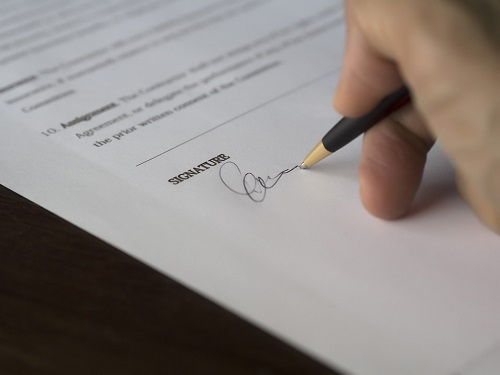 In the scenario presented last week, a man appeared before a Notary claiming to have a power of attorney to sign on behalf of his elderly aunt. And he insisted that he only sign his aunt’s name on the document, and not his own name.
In the scenario presented last week, a man appeared before a Notary claiming to have a power of attorney to sign on behalf of his elderly aunt. And he insisted that he only sign his aunt’s name on the document, and not his own name.
This real-life encounter raises potential issues, including the possibility that the signer may be attempting to engage in fraud. Even if there is no fraud, the request may cause issues in the future if the document is challenged.
What you said
One of the most common responses that came from our community was to ask to see a copy of the power of attorney from the aunt.
“This situation screams of the potential for fraud,” wrote Notary Brent Gill. “Ask for a copy of the power of attorney and explain that, without it, you can't proceed.”
“If there is no proof of the POA, I would refuse until they could produce it,” noted Helen Dugan.
Others has a more strident reaction. Frank Bagnato wrote that he would “absolutely, unequivocally, NOT” go through with the notarization.
Manny Martinez agreed. “I would definitely walk away. If you don’t, you’re part of the fraud."
But the overwhelming sentiment from our community is that the Notary should not do as the signer requests.
Fred Dellar said he would insist that the man sign his name as the attorney in fact for the aunt. “If he signs only her name and not his name as attorney in fact I would think that would be a form of forgery.”
“The appropriate way to sign the document is ‘John Jones, attorney-in-fact for Jane Doe,’” wrote Jack Crawford. “John signs his name and the Notary notarizes his signature.”
Standards of practice
Whenever anyone claims to have the authority to sign on behalf of another person, they are acting as an attorney in fact and the person who gave them that authority is the principal.
As Crawford noted above, a typical way an attorney in fact might sign the document is as follows: “John Doe, attorney in fact for Jane Smith.” An alternative way to sign is: “Jane Smith, by John Doe, attorney in fact.” The issuing or receiving party should instruct the attorney in fact just how to sign. Whatever the form, all parties to the document need to know that an attorney in fact actually is signing the document for the principal. Without a clear indication of the authority of the individual signing, the validity of the document could be questioned.
When dealing with an attorney in fact, even though the document may name the principal, you actually notarize signature of the attorney in fact. The name on the notarial certificate would be John Doe’s, and your journal entry would reflect that you notarized his signature. If your state requires the journal entry to be signed, you must obtain the signature of the attorney in fact. California Notaries also would need to record the man’s thumbprint in their journal entry if the particular document is a deed, quitclaim deed, deed of trust or other document affecting real property.
If the man in this scenario signed only his aunt’s name, you could not notarize that signature. If you did, you would be certifying that the aunt appeared before you and signed the document, which is not true.
As for asking to see a copy of the power of attorney, few states require Notaries to verify an individual’s status as an attorney in fact. Most do not because it is not the role of a non-Notary to exercise any legal judgment. Examining a power of attorney and determining who may sign could violate state unauthorized practice of law rules.
Most notarial certificates will state that the individual signing the document as attorney in fact or in a representative capacity acknowledged signing the document under that authority. It’s not the Notary’s job to prove the individual has that authority; however, it is the Notary’s job to ensure the attorney in fact acknowledged signing as attorney in fact.
Related Articles:
What Would You Do: The case of the absent signer